Jackals' Revenge Read online
Page 22
‘We’ll just have to replace them then.’ Kippenberger turned to the men behind him. ‘Right, I need two volunteers to replace Lieutenant Farran’s wounded men and go again. Any takers?’
There was a clamour of voices and at least a score of men began to walk forward. Lamb got to his feet and walked up to Farran. ‘You know, I’m pretty good with motor vehicles, Lieutenant. Not a bad shot, either.’
Kippenberger turned. ‘Lamb? Sorry, can’t spare you. You’re one of the most senior officers we have left here.’
‘But sir, please.’
‘I’ve given you an order, Lamb. Obey it.’
In the end they found two privates, and as soon as the wounded had been taken out the volunteers jumped into the blood-stained, sweat-drenched turret.
Kippenberger was busy briefing the men he had selected to follow the tanks, C and D Company of what was left of 23 Battalion. Lamb approached him. ‘Can I at least go in with the infantry, sir? Look, you can see my boys are spoiling for a fight.’
Kippenberger nodded. ‘Very well, but remember this is a counter-attack, not a suicide mission.’
He turned to Farran. ‘Do not go any further than the village square. I want your tanks back intact and my lads and yours alive. Is that clear?’
‘Yes, sir, I’ll do what I can. But you seldom come out of these things alive.’ Farran climbed into his turret and closed the lid.
Lamb checked the magazine on his Schmeisser and that he had three others tucked into his belt. Hand-grenades too. He watched as, well trained by Bennett and the other NCOs, his men and the Greeks did the same. He was conscious of someone standing behind him and turned to see Anna. He whispered, ‘I wanted to talk to you, but I don’t think now is quite the time.’
She smiled and reached to hold his hand, as if she were shaking it, but then held on for longer. He looked into her eyes and mouthed a few words which she seemed to understand. Then she let go and she swung the rifle from her back and checked the magazine.
‘You’re not coming with us.’
‘Yes we are.’
‘That wasn’t a question. It was an order. You’re not coming with us, Anna.’
‘Try to stop me, Peter. Just try.’
The tanks started off down the road on the 200 yards back into the village, from which they could see plumes of smoke rising. It was not quite dark now, at around 8 o’clock. The infantry followed them through the clouds of dust from the dry road, marching at first, well spread out, and then over the last fifty yards at a run. C Company went up the road with D Company moving to the left flank. Lamb took his men and all the Greeks over to the right and saw that they had been joined there by another force led by a familiar fair-haired officer in a yellow jersey.
Hathaway blew frantically on his whistle, and at the same time, above the din of the small-arms fire from both sides and the clank of the tanks, there came another sound. From the whole of the advancing battle line came an assortment of war cries. Lamb had never heard anything quite like it. He found a New Zealand corporal on his left. ‘What the devil’s that racket?’
‘It’s the haka, sir. Maori battle cry. They started it, at least, Maoris did. Those lads, over there on the other side of the road. But the thing is, sir, back home every school and college has its own haka. Try to stop us.’ And he joined in the yell in a deep, rumbling, primeval voice.
En masse the noise was appalling and at the same time blood-chilling. Lamb thought he should yell himself and smiled at Bennett as he did so. ‘Come on the Jackals.’ He followed it with the sort of thing he had been taught at bayonet drill and it blended well into the mix, which was now just a primitive roar and enough to put the wind up anyone on the receiving end.
Charging down the right edge of the village Lamb could see that most of the enemy fire was concentrated against the tanks and the infantry on the main road and was damn glad that he hadn’t gone that way. After 300 yards he signalled to the men to turn in and they found themselves in the main square by the church. About a dozen houses were on fire, including Kippenberger’s former HQ. The tanks were in the centre of the square and it was clear that one of them was in trouble. Lamb could see that it had been taken out by a grenade hit and that Farran and his crew, all of them wounded, were lying and sitting beside it. He ran across and bent down. ‘Don’t move. You’re all right.’
As Lamb watched, crouching over Farran, the second tank lurched into a gutter. He pressed a dressing on Farran’s wound and, thinking that the tank might have slipped a track, ran across to see if he could help, only to find the commander emerging from the turret. The man was jabbering. ‘It’s useless. I can’t speak to the driver. The bloody speaking tube’s gone.’
Lamb climbed up and grabbed him by the shoulder. ‘Nonsense, man. Get back in there. We need you. Come on.’ The man dropped back down and Lamb leaped off the tank, which turned and began once again to lead the way for the advancing infantry.
Valentine was beside him now with what was left of his section. ‘Sir, look.’ The far side of the square was full of Germans and New Zealanders, fighting hand to hand. As Lamb watched them a huge German picked up one of the smaller Kiwis by the neck and used him as a human shield to ward off another’s jab with a bayonet. The lunge just missed the man who was yelling and kicking against the massive German. Lamb ran over and, taking out the commando knife he had won at gambling, stuck it deep into the German’s side and pulled it out, wiping it on the grey-green uniform which he saw was embroidered with a small white and yellow flower. The dying man dropped the Kiwi and sank to the ground. More of the enemy were forming up across the square.
Lamb turned to Valentine and his men. Saw Eadie. ‘Charles. We must charge them. Can you do it?’
‘Yes, sir.’
Lamb found Bennett. ‘Sarnt-Major, we’re going to charge. Bayonets, anything. Come on. With me.’
The company, together with the Greeks and Bandouvas’ men, turned behind Lamb and Eadie and raced across the square, smashing into the Germans before they had a chance. The sheer weight of them bowled the Germans over and Lamb saw eighteen-inch bayonets thrust deep into throats and chests. He saw Anna, in the thick of it, fire from the hip and shoot a man at point-blank range, leaving a scorch mark on the crumpling body. Above the din he heard Farran’s distinctive English voice. ‘Come on New Zealand. Let them have it.’ Then it was subsumed by the high-pitched scream of a man who had been stabbed through the stomach. There were dead and wounded all around him now, it seemed, but still their charge went on, out across the little square and into the alleyways, chasing the Germans back the way they had come towards Pink Hill.
Lamb and his men went with them, clearing the houses with grenades and bayonets in a blur of combat. Parry, lunge, twist, withdraw, again and again and again. Lamb knew that in this sort of fighting every split second would count. Panicked, the Germans turned and fled.
Lamb was leading from the front, but as they cleared more houses he became aware that men from other units were losing their way, doubling back on themselves, so that he would see the same faces over again. He knew the reason. Their officers were all down, dead or wounded.
He found Eadie. ‘We’ve got to restore order. Find any Kiwi officers you can. They must reorganise. The Jerries could counter-attack at any moment.’ Aware that it was all too easy in a pursuit such as this to get ahead of yourself and end up out on a limb, Lamb ran back into the square.
There, as if to answer his request, he was met by a New Zealand major. ‘Thomason. I/C of the 23rd. Well done. You seem to have cleared them out.’
Lamb shook his head. ‘Yes, sir, but your lads don’t seem to want to give up. They’re after them down the hill.’ The major turned to a colour sergeant. ‘Colour Sarnt Macleod, get down the hill and pull them back before we lose the lot of them.’
It was approaching midnight when Lamb at last sat down on one of the pock-marked walls in the church square. The clear night sky was lit by the leaping flames from a score of b
urning buildings, but amazingly Anna’s kafeneio was not among them. He had seen her a few moments ago and knew she had made it through the fight. He wondered how, though, for it had been perhaps the fiercest engagement in which he had ever taken part. He supposed it had been worthwhile.
They had retaken Galatas. The front line had been stabilised, and the New Zealanders had gained a vital breathing space. But what, he wondered, had been the cost? Hallam, whom he had encountered on one of the side streets, covered in blood, his own and that of others, had told him that of all the New Zealand officers only four subalterns were left standing by the end of the action.
Kippenberger had wanted to go again, but Thomason and a few others had refused, telling him the men were on the verge of exhaustion. In any case, thought Lamb, the Jerries seemed to have dug in for the night. They had taken the village, but as far as any military purpose went they had effectively lost 10th Brigade. And he still hadn’t got to the King.
Charles Eadie interrupted his thoughts. ‘Sir, I think you should see these.’ He presented Lamb with a bloodstained bundle of papers. ‘Mays found them on a dead German major.’
Lamb took the bundle and began to read. His German was worse than rudimentary, almost non-existent, but even he could make out references to ‘der Koenig’. And there was a map of a house.
‘What d’you make of it, Charles?’
‘I’ve only a little German, sir, but I know that it’s about the King. The King of Greece, sir. I’ll find Valentine, shall I?’
Valentine had to be extricated from celebrations among the Greeks, who had opened a bottle of raki. He returned bearing a Schmeisser.
‘Look, sir. Isn’t she a beauty? May I be permitted to keep her?’
‘You may. But only if you can translate this for me, Sergeant.’
Valentine scanned the papers. ‘Hmm. Yes, this is all about the King of Greece, sir. Says he’s on Crete and the Jerries want him, dead or alive. Seems he’s a threat to Greece and the Reich. It’s signed … oh, what do you know? It’s signed Adolf Hitler.’
He held out the last sheet to Lamb, who took it and ran his hand over the signature.
Valentine continued. ‘There are details, sir. Exact details of where the King was, erm, yes, four days ago. Look, there’s a plan of the house. Their intelligence really is astonishing, isn’t it?’
Lamb gazed at the plan of the villa Bella Campagna, with its German annotations, and thought for a moment. As far as he could recall Hathaway had told him they had moved the King only recently, which meant that somehow the Germans had got this knowledge from the island in the past week. He knew that there were spies around them and that some of the Greeks at least were sympathetic to the German cause. But the detail here was extraordinary.
‘Thank you, Charles. Of course you know what this means.’
Eadie looked sheepish. ‘That the Germans want the King?’
‘It means he is now in real danger, more than we had thought. It also means that what Hathaway was saying wasn’t complete tosh. For some reason the King and his tinplate medals really are important to the Germans. To Hitler himself, it seems. It means we’ve got to get to him before the Jerries do.’
Eadie tapped the side of his head. ‘Oh, sir, one more thing. Captain Hathaway gave me a message for you. Said to tell you that he had good word that the King was safe in an old Turkish fort outside Pirgos, to the south. And that Mr Tsouderos never did get the Greeks together. The King’s only got Lieutenant Ryan’s men, and it seems a few of them haven’t made it.’
Lamb swore. ‘That bloody man. Christ, he’s got a nerve to pass that message on. Where the hell is he?’
‘Last seen taking his Greeks back to Canea, sir.’
‘So he’s ducked out again.’
‘Steady on, sir. He hardly ducked out yesterday.’
Lamb nodded. ‘Yes, that was unfair of me. Still …’ He turned to Bennett. ‘Do you suppose we’ve done enough here, Sarnt-Major?’
‘We’ve helped them all we can, sir, and more, if that’s what you mean.’
Lamb looked across the square and saw the triumphant Kiwis returning from their pursuit. ‘Well, that’s it then. We’ve gained Galatas but we’ve lost most of the brigade, and anyway it looks like we’ve lost the bloody island.’
It was true. One thing he knew, though, was that he and his men had done their best. ‘Well, one thing’s for certain. We’re not going to lose the bloody King. Come on.’
14
They had been walking for some hours. Lamb had led them from the lines shortly before dawn. Amid the chaos and exhaustion they had not been missed. They were a small party: his own men, Bandouvas’ brigands and some villagers, including Anna. Lamb had been surprised that Bandouvas had come with them. Of course he had asked the man if he could spare a guide and had told him in confidence the nature of their mission. But with all the talk, not least from Anna, about how much the Cretans hated the royal family he was astonished at Bandouvas having volunteered to lead them down to the little harbour of Sfakia on the south coast. He reasoned that there was now little option for the Greeks, other than fighting on in a hopeless position with the British. Crete was a lost cause.
Valentine as usual had got the gist of Kippenberger’s plan from his batman after the colonel had gone to give his report to Brigade command in Canea. He was going to be forced to pull out of Galatas. There was nothing for it. Despite their victory, the village could not be held. The idea now was to form a line from just outside Canea down to the area of the hills around Pirgos, to the west of Perivolia and their old camp. This was the precise location, in fact, of the fort in which Hathaway had told him the King was now in hiding. It was clear to Lamb that they did not have a moment to lose.
They marched across country towards the south east, moving as directly as they could towards the fort. As far as Lamb was aware the 2nd Greek Battalion still held the ground around there, if they existed as a unit after the German onslaught. But God alone knew where the Germans were.
Bandouvas led the way, keen to show off his local knowledge and to prove the most useful member of the party. He was acutely conscious that he was a better warrior than any of the British officers, even if they were off to save a man whom he vehemently detested. Anna went with him and his partisans, and Lamb and his men followed on behind. They had left the Greeks at Galatas. Lamb knew they would find their way to Hathaway soon enough.
Crossing the bridge to the east of the village, they made for Karatsos, but then at a little hilltop church Bandouvas turned south. The sun was rising in the sky as they came down the slopes towards the main Canea road, and Lamb realised there were two ways they could choose to go. One would take them further east through their own lines and straight down through Platanos and Perivolia. The other took them cross-country across the road and the river, through the lower reaches of Prison Valley and then directly up the mountain to the fort. That of course was the shorter. It was also by far the more dangerous. There was no doubt in his mind that the Germans who had been in Prison Valley must by now have advanced further along the road. For all he knew they might even hold Perivolia. He looked up ahead at Bandouvas and ran along the road to catch him up.
‘Kapitan, which way are you taking us?’
‘Why, the quickest way, of course.’
‘Across the river.’
‘Yes, naturally.’
‘You do know that it will be swarming with Jerries?’
Bandouvas nodded. ‘My gun is hungry for more of them.’
Lamb chose not to argue. For one thing he knew it would be bad form to appear to Bandouvas like someone who wanted to avoid the enemy. For another, he knew they had to get to the King first, and if that meant cutting through the enemy lines before the Germans found him themselves, then so be it. ‘Good. I was just checking.’
He paused for a moment to exchange glances with Anna and then, returning to the men, found Valentine and Bennett marching together at their head. Valentine spoke. �
�I was just telling the Sarnt-Major, sir. You know what they’ve christened us. Some clever dicks in the Kiwis?’
‘No, surprise me, Valentine.’
‘The Royal Perivolians, sir. On account of the fact that we went off to save the King at the villa and …’
‘… that we came from the transit camp at Perivolia. It’s quite catchy.’
‘I prefer the Jackals, sir. That’s always been good enough for us, hasn’t it? Anyway, who wants to be a royal regiment?’
‘Yes, perhaps it is a bit long-winded.’
Bandouvas led them sharply off the road and across a long, low stretch of vineyards. He waved them down into a running crouch. Looking to their right Lamb could see down the valley towards the white blocks of the prison. There seemed to be a frenzy of activity going on in front of it and he hoped they would make the cover of the hills before they were spotted. They had reached the base of the slope when there was the sound of motors from the valley and to his horror six trucks, captured from the Allies by the look of them, began to drive directly towards them up the road to Canea. Lamb broke into a proper run and dashed for some long grass. He was followed by the rest of the men and could see that up ahead Bandouvas and his party were already in cover behind a rocky outcrop. Moving slowly to their left they began to edge around the north side of the hill. The trucks were closer now, and Lamb and the others ducked down in the grass. Then one of the trucks began to slow down and came to a stop parallel to where they were lying. As Lamb watched in trepidation four men got out, all armed with Schmeissers, and moved to their side of the truck. Surely, he thought, they couldn’t have seen anything. We must be out of sight. The four Germans began to walk into the vineyard and then, reaching a wall, they stopped. Turning away from one another they began to fumble with the front of their tunics and Lamb realised the reason for their having stopped. As they peed against the wall, the men laughed with each other. He shook his head and then saw that the men were walking back towards the truck. The bizarre interlude had him worried. If the enemy felt confident enough to stop in the open to pee, they must have been under the impression they were some distance from their opponents. And if that were the case, then somehow he and Bandouvas must have got deep inside their lines.

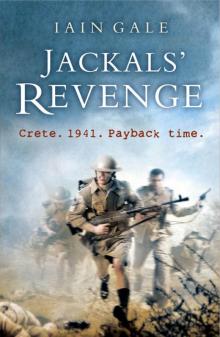 Jackals' Revenge
Jackals' Revenge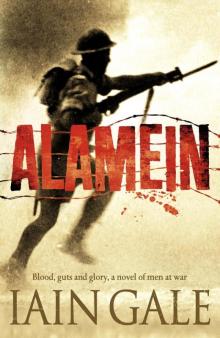 Alamein
Alamein Conspiracy
Conspiracy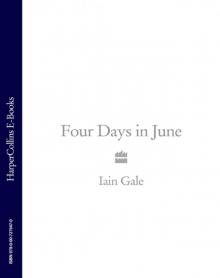 Four Days in June
Four Days in June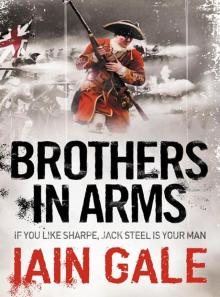 Brothers in Arms (Jack Steel 3)
Brothers in Arms (Jack Steel 3) Brothers in Arms
Brothers in Arms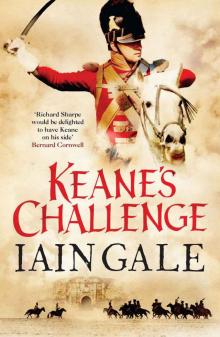 02 - Keane's Challenge
02 - Keane's Challenge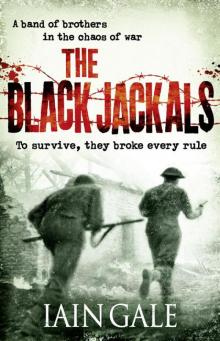 The Black Jackals
The Black Jackals Man of Honour
Man of Honour Rules of War
Rules of War